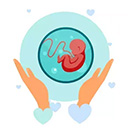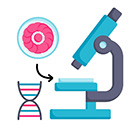Is IVF Safe? Everything You Need to Know About In Vitro Fertilization
In vitro fertilization, or IVF, has been a game-changer for millions of people dreaming of starting a family. If you’re reading this, chances are you’ve heard about it—maybe from a friend, a doctor, or even a celebrity story. But one question keeps popping up: Is IVF safe? It’s a big deal to think about, especially when you’re considering something that involves your body, your future, and maybe even a tiny human.
IVF isn’t just a buzzword; it’s a process that’s helped over 8 million babies come into the world since it began in 1978. That’s a lot of birthday candles! But with all the hope it brings, there’s also a swirl of worries—about side effects, risks, and what it means for you and your baby down the road. This article is here to dig into all of that. We’ll break it down step-by-step, look at the latest science, and even sprinkle in some real-life insights so you can feel confident about what’s ahead. Ready? Let’s dive in.
What Exactly Is IVF, and How Does It Work?
IVF stands for in vitro fertilization, which is a fancy way of saying “fertilization outside the body.” Picture this: instead of an egg and sperm meeting naturally inside a woman’s body, doctors help them connect in a lab. Then, once an embryo forms, it’s placed back into the uterus to grow into a baby. It’s like giving nature a little nudge.
Here’s a quick rundown of how it happens:
- Ovary Boost: You’ll take medications to kick your ovaries into high gear, producing more eggs than usual.
- Egg Pickup: A doctor uses a tiny needle to collect those eggs—don’t worry, you’re asleep for this part!
- Sperm Meets Egg: In a lab, the eggs get paired with sperm (either from a partner or a donor) to create embryos.
- Embryo Transfer: One or two healthy embryos are placed into the uterus, hoping they’ll stick around and grow.
- Waiting Game: About two weeks later, a pregnancy test tells you if it worked.
Sounds simple, right? But there’s a lot going on behind the scenes, and that’s where the safety questions come in. Let’s tackle those next.
Is IVF Safe for Your Body?
When you’re thinking about IVF, one of the first things you might wonder is, “What’s this going to do to me?” It’s a fair question—after all, you’re signing up for medications, procedures, and maybe some emotional rollercoasters. Let’s look at what the science says about how IVF affects your body.
The Medication Factor
To get those eggs ready, you’ll use fertility drugs like gonadotropins. These hormones tell your ovaries to produce multiple eggs at once—way more than the one egg you’d typically release each month. For most people, this feels like a mild version of PMS: bloating, mood swings, or tender ovaries.
But there’s a rare catch called Ovarian Hyperstimulation Syndrome (OHSS). It happens in about 1-5% of IVF cycles, according to the American Society for Reproductive Medicine (ASRM). OHSS can make your ovaries swell and leak fluid into your belly, causing discomfort or, in severe cases, needing a doctor’s attention. The good news? Clinics today are better at spotting and preventing it by tweaking your meds if things look risky.
✔️ Tip: Ask your doctor about “mild IVF,” which uses lower doses of drugs to cut down on side effects.
❌ Watch Out: Don’t skip follow-up appointments—catching OHSS early makes a huge difference.
The Egg Retrieval Process
Next up is egg retrieval, where a needle guided by ultrasound grabs the eggs from your ovaries. You’re under sedation, so it’s painless, but it’s still a minor surgery. Studies, like one from the journal Fertility and Sterility in 2020, show complications—like bleeding or infection—happen in less than 0.2% of cases. That’s super rare, about the same odds as winning a small lottery prize!
✔️ Tip: Rest up after retrieval; a day on the couch can help your body bounce back.
❌ Watch Out: Call your clinic if you feel sharp pain or fever afterward—it’s rare, but worth checking.
Long-Term Health: What’s the Real Story?
You might’ve heard whispers about IVF raising cancer risks, especially breast or ovarian cancer. Let’s clear the air. A massive 2023 study from the University of Pennsylvania tracked over 30,000 women who did IVF and found no significant link between IVF and higher cancer rates after 20 years. The hormones don’t seem to flip some scary switch in your body. Phew, right?
Still, if you’ve got a family history of cancer, chat with your doctor. They might suggest extra screenings, just to be safe.
Is IVF Safe for the Baby?
Okay, so IVF might be safe for you—but what about the little one you’re hoping for? Parents-to-be often worry about birth defects, prematurity, or long-term health issues. Let’s unpack this with the latest facts.
Birth Defects: Separating Myth from Reality
A 2019 study in The Lancet found that babies born through IVF have a slightly higher chance of birth defects—about 4% compared to 3% in naturally conceived babies. That’s a tiny bump, and experts think it’s more about infertility itself than IVF. For example, if you’ve got blocked tubes or low sperm count, those underlying issues might play a role, not the lab process.
Here’s something cool: Preimplantation Genetic Testing (PGT) can screen embryos for genetic problems before transfer. It’s not foolproof, but it’s like a safety net that’s getting better every year.
✔️ Tip: Ask your clinic about PGT if you’re worried about genetic risks.
❌ Watch Out: Don’t assume every IVF baby has issues—most are perfectly healthy!
Premature Birth and Low Birth Weight
IVF babies are more likely to arrive early or weigh less—about 10% are preterm compared to 7% naturally, per the CDC. Why? Multiple births (twins or more) are common with IVF, and multiples often come early. But here’s the shift: clinics now push for single embryo transfers, cutting the twin rate from 30% in the 2000s to under 10% today. Fewer twins mean fewer preterm risks.
✔️ Tip: Opt for single embryo transfer if your doctor says it’s a good fit—less risk, same reward.
❌ Watch Out: Don’t pressure yourself into transferring multiple embryos just to “up your odds.”
Growing Up Healthy
What about later in life? A 2022 study from the Netherlands followed IVF kids into their 20s and found they’re just as healthy as their peers—same rates of obesity, diabetes, and even school performance. That’s reassuring! The tech has come a long way since the early days, and today’s embryos get VIP treatment in the lab.
Emotional Safety: The Hidden Side of IVF
IVF isn’t just physical—it’s a mental marathon too. The waiting, the hoping, the what-ifs—it can feel like a lot. Studies show about 30% of people going through IVF report anxiety or depression, especially if it doesn’t work the first time. But here’s the flip side: when it succeeds, the joy is off the charts.
Managing the Stress
You don’t have to tough it out alone. Support groups, therapy, or even a good chat with a friend can lighten the load. A 2024 survey by Resolve: The National Infertility Association found that 70% of IVF patients felt better after joining a community—online or in person.
✔️ Tip: Try a mindfulness app like Calm—five minutes a day can ease the tension.
❌ Watch Out: Don’t bottle it up; stress doesn’t help your chances.
Quick Check-In: How Are You Feeling?
Here’s a little quiz to keep you engaged—answer in your head:
- Do you feel supported in your IVF journey? (Yes/No)
- Have you talked to someone about your worries? (Yes/No)
- Are you giving yourself a break when you need it? (Yes/No)
If you said “No” to any, maybe it’s time to reach out. You’ve got this!
New Angles: What’s Not Talked About Enough?
Most articles cover the basics—meds, risks, success rates. But there are some under-the-radar topics that deserve a spotlight. Let’s explore three areas you won’t find everywhere.
The Air Quality Connection
Did you know the air in the IVF lab matters? A 2023 study from Human Reproduction found that labs with top-notch air filtration systems (think HEPA filters) had 10% higher success rates. Tiny pollutants can mess with embryo development, but most clinics don’t brag about their air game. Next time you’re touring a facility, ask about their air quality—it’s a sneaky factor in your favor.
✔️ Tip: Pick a clinic that’s picky about clean air—it’s a small detail with big impact.
Frozen vs. Fresh: The Safety Edge
Lots of people assume fresh embryo transfers are best, but frozen might be safer. A 2024 analysis in Fertility and Sterility showed frozen transfers lower the risk of OHSS by 20% and give your body a break between egg retrieval and transfer. Plus, success rates are neck-and-neck with fresh these days—sometimes even better.
✔️ Tip: Talk to your doctor about freezing embryos, especially if you’re prone to overstimulation.
The Partner’s Role in Safety
IVF isn’t just about the person carrying the baby—partners matter too. Stress in male partners can drop sperm quality, and a 2023 study from the University of California found that couples who tackled IVF as a team (think joint appointments or shared relaxation time) had 15% higher success rates. It’s not just science; it’s teamwork.
✔️ Tip: Plan a low-key date night during IVF—it’s good for both of you.
Success Rates: What’s Safe and Effective?
Safety’s great, but you also want IVF to work. Success rates depend on age, health, and clinic quality. Here’s a snapshot from the CDC’s 2023 data:
| Age Group | Live Birth Rate per Cycle |
|---|---|
| Under 35 | 50% |
| 35-37 | 38% |
| 38-40 | 25% |
| Over 40 | 10% |
Younger eggs mean better odds, but don’t let the numbers scare you—clinics tweak protocols to boost your chances, like using donor eggs if needed.
✔️ Tip: Check your clinic’s success rates on the SART website—it’s like a report card for fertility centers.
Real Stories: Putting Safety in Perspective
Numbers are one thing, but stories hit different. Take Sarah, a 34-year-old from Oregon. She did IVF in 2023 after years of trying naturally. “I was terrified of the needles and what might go wrong,” she says. “But my clinic walked me through every step, and I only had mild bloating. My son’s here now, and I’d do it again in a heartbeat.”
Then there’s Mike, 40, whose wife used frozen embryos. “We worried about the baby’s health, but our doctor showed us the data. Our twins are 2 now, and they’re tearing up the house like champs.”
These aren’t rare wins—millions have similar tales. IVF’s risks are real but manageable, and the payoff can be life-changing.
Your Safety Checklist: Making IVF Work for You
Ready to take the plunge? Here’s a practical guide to keep things safe and smooth:
- Pick a Solid Clinic: Look for board-certified doctors and high success rates. Bonus points if they’re transparent about risks.
- Know Your Body: Share your full health history—allergies, past surgeries, everything. It helps tailor your plan.
- Ask Questions: What’s their OHSS prevention strategy? How do they handle complications? Get the details.
- Lean on Support: Bring a partner, friend, or counselor along for the ride—it’s less lonely.
- Rest Up: Give yourself downtime after procedures; your body deserves it.
What’s the Latest Buzz on IVF Safety?
Social media’s buzzing about IVF lately—posts on X show people asking about long-term effects and sharing success stories. Google Trends in 2025 shows spikes in searches like “IVF safety for older moms” and “is IVF worth the risk,” especially after new studies hit the news. People want answers that go beyond the basics, and they’re digging for real experiences. That’s why we’re here—giving you the full scoop.
Vote Time: What’s Your Take?
Let’s make this fun—cast your vote:
- Do you think IVF is safe enough to try? (Yes/No/Maybe)
- What worries you most—side effects, baby health, or something else? (Pick one)
Drop your thoughts in your mind (or a comment if you’re feeling chatty). It’s a great way to see where you stand!
Wrapping It Up: Is IVF Really Safe?
So, is IVF safe? The short answer: Yes, for most people, with some caveats. The risks—OHSS, minor surgery hiccups, or emotional stress—are real but rare and getting rarer as tech improves. Babies born through IVF are overwhelmingly healthy, and new tricks like frozen transfers and air quality upgrades are making it even safer.
It’s not a walk in the park, but it’s not a horror story either. With the right clinic, a solid plan, and a little support, IVF can be a safe path to the family you’ve been dreaming of. What do you think—ready to explore it more? Your journey’s yours to shape, and the science is on your side.







